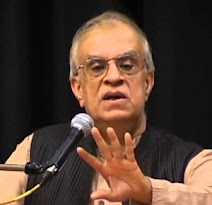This book, one of the most insightful one I have ever read, is authored by Rajiv Malhotra, an Indian-American author, philanthropist and public speaker. It was published by HarperCollins in 2011. The book looks at the West from a an Eastern point of view, repositioning India from being the observed to the observer.
Malhotra gives a critique of western culture, by comparing it with Indian culture, as seen from a 'Dharmic point of view.' He postulates a set of characteristics of western culture, and a set of characteristics of Indian culture and religion, characterised as "Dharmic."
The term 'Dharma' is used to indicate a family of spiritual traditions that include Hinduism, Buddhism, Jainism and Sikhism. He contrasts the family of Dharmic traditions with Abrahamic religions. His intention is not to replace the West-centric view with a Dharma-centric view, but to have a dialogue in which the world civilizations are not seen from the viewpoint of the West alone, but the west is also seen from a non-western, 'dharmic' point of view. In such a dialogue, there must be mutual respect instead of tolerance.
How do we know?
The author argues that the East and West approach the question of how we attain knowledge differently. For the west, knowledge that we need has already been revealed through past events and people, and has been recorded in the Sacred Scriptures. All that we need to do is to believe whatever has been revealed. However, in the East, we don’t depend on the past events for knowledge. We make our own enquiry in the present. We don’t need to believe in anything.
Imagine a country which has all the media channels controlled by the government. People can watch only what the government wants them to watch. They hear only whatever the government wants them to hear. People don’t have freedom there to seek and find the truth. They just have to believe whatever their government tells them. This is how the west is. The Abrahamic religions—Judaism, Christianity, and Islam-- do not give freedom to the people to find the truth for themselves. They just have to believe whatever they are told to believe. Compare this situation with a country in which their government does not control the media, and people are free to watch whichever channels they want. The Dharmic religions – Hinduism, Buddhism, Jainism, and Sikhism – are like this. People have freedom to discover the truth for themselves. They can believe whatever they want to believe or remain without believing.
Because the Abrahamic religions claim custody of truth, they cannot respect the beliefs of others. Even within these religions, there are numerous sub-sects, and they cannot agree with one another. They are missionary religions, who try to convert people of other beliefs to their own belief system. None of the Abrahamic religions or their subsects can live peacefully in the modern pluralistic societies.
The Dharmic religions, on the other hand, do not claim custody of any knowledge or beliefs, and so they respect all people regardless of what they believe. They are willing to accept all people regardless of what they believe. They can live peacefully in a pluralistic society without any problem at all.
What do we know?
Regarding the question of what we know, East and West have contradictory answers according to the author. According to the East, the world is really a unity though it appears to be multiple on the surface. According to the West, the world is really a multiplicity, and it needs to evolve to a unity.
For the East, the Dharmic view, there is unity in diversity—real unity at the base, and it appears diverse. Thus unity and diversity co-exist. Chaos and cosmos co-exist. All we need to attain is to realize the underlying unity.
For the West, the Abrahamic view, there is really chaos, and we need to achieve unity. The Abrahamic religions help people to bridge the gaps and create unity so that we can have a peaceful life. There are gaps everywhere – between man and God, between man and man, and between man and nature. All these gaps need to be bridged.
The author further observes that during the age of enlightenment, people like Hegel created a very negative view of Asia and Africa. According to Hegel, Europeans were superior to Asian and Africans, and Germans were the most superior among them. This view of looking down on Asians and Africans still prevails in the world, and it needs to change.
Rajiv Malhotra argues that in the last few centuries, when the west dominated the world, they developed a west-centric worldview, and we have blindly followed it. Although the British left us half a century ago, we slavishly continue their worldview. We need to look at the world from our own eyes rather than through their eyes. The author presents Mahatma Gandhi as our role model in this. His life and ideals is an illustration of how we may view our life and the world, and live a meaningful life.
Conclusion
I think Rajiv Malhotra is presenting an important point in this book. It helps us to reexamine our view of ourselves. Are we still looking at the world through the eyes of the Europeans, or are we using our own eyes? Do we claim custody of truth, or are we open? Can we live peacefully in the modern pluralistic society?


No comments:
Post a Comment